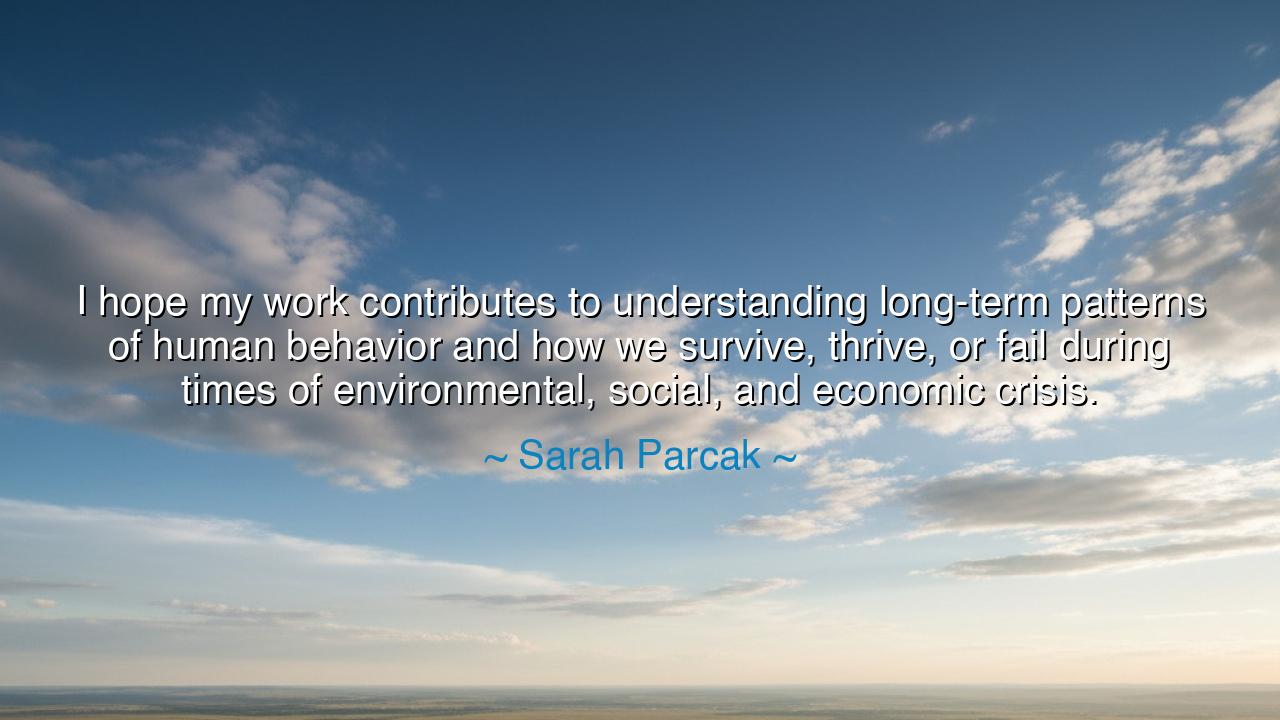
I hope my work contributes to understanding long-term patterns of
I hope my work contributes to understanding long-term patterns of human behavior and how we survive, thrive, or fail during times of environmental, social, and economic crisis.






Hear now the words of Sarah Parcak, the seeker of the past who gazes from the heavens to the earth, and declares: “I hope my work contributes to understanding long-term patterns of human behavior and how we survive, thrive, or fail during times of environmental, social, and economic crisis.” In this statement lies not merely the passion of an archaeologist, but the timeless cry of wisdom: that we must look to the chronicles of the past if we are to endure the storms of the present and the trials yet to come. Her words are not for scholars alone, but for all who would learn how civilizations rise and fall beneath the weight of their choices.
She speaks of long-term patterns, the threads that run through centuries, binding the deeds of our ancestors to our own lives. The collapse of one empire, the flourishing of another—these are not accidents of fate but the harvest of decisions sown by human hands. Societies that learned to live with their land, their people, and their neighbors endured. Those that consumed beyond measure, that ignored justice, or that closed their ears to warning signs, withered like neglected crops. Parcak’s labor is to uncover these truths, so that future generations may not stumble blindly into the same abyss.
Consider the story of the Maya, whose cities once rose like jewels in the forests of Central America. Their pyramids pierced the heavens, their knowledge of the stars rivaled the greatest of antiquity. Yet when prolonged drought struck, when their fields failed and their rulers clung to ritual rather than reform, their civilization cracked. Great cities fell silent, swallowed by jungle. The people did not vanish, but their golden age dissolved. Here we see the pattern: in times of environmental crisis, survival belongs not to the proud, but to the adaptable.
Look also to the Roman Empire, which thrived for centuries by binding lands together with law, roads, and commerce. Yet as greed hollowed its heart, as inequality widened and invaders pressed its borders, the empire faltered. No single battle destroyed Rome, but a long pattern of neglect, corruption, and disunity. Parcak’s words remind us that economic and social crises reveal not only the strength of armies, but the strength—or weakness—of values. For in times of trial, what truly sustains a people is their capacity to adapt with justice, unity, and foresight.
The meaning of her declaration is therefore both a warning and a gift. It is a warning that no society, however mighty, is immune to failure if it ignores the lessons of history. But it is also a gift, for the patterns she reveals are not only of collapse, but of survival and thriving. For every tale of decline, there is also a tale of renewal: of communities that rebuilt after disaster, of nations that reformed their ways, of cultures that endured by balancing human need with the limits of the earth.
What, then, is the lesson we must take into our own lives? It is this: be attentive to the patterns. Ask yourselves, are we repeating the blindness of those who fell before us, or are we forging a wiser path? In your homes, do not waste what is precious. In your communities, do not allow division to eat away at solidarity. In your nations, demand leaders who plan not only for the moment, but for the generations yet unborn. For it is not only kings and empires that shape destiny; every citizen’s choice adds weight to the scales of survival or ruin.
To you, children of the future, I say: live with reverence for history. Seek wisdom in the ruins, for they are teachers as much as any living voice. Support the work of those who study the earth, the skies, and the past, for they hold keys to understanding the challenges that loom. And above all, remember that crises are crossroads: they may lead to collapse, but they may also lead to renewal, if met with courage and vision.
Thus let Sarah Parcak’s words be as a beacon: she peers into the shadows of forgotten civilizations not out of curiosity alone, but to arm us with the wisdom of ages. May we heed her call, and may we, in our own time of trial, choose not the path of failure, but the path of endurance, adaptation, and triumph.






AAdministratorAdministrator
Welcome, honored guests. Please leave a comment, we will respond soon